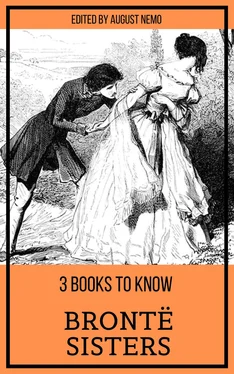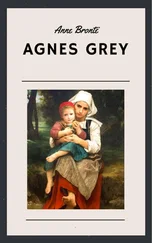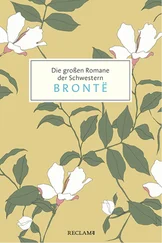I will just touch upon two other persons whom I have mentioned, and then bring this long letter to a close. These are Mrs. Wilson and her daughter. The former was the widow of a substantial farmer, a narrow-minded, tattling old gossip, whose character is not worth describing. She had two sons, Robert, a rough countrified farmer, and Richard, a retiring, studious young man, who was studying the classics with the vicar’s assistance, preparing for college, with a view to enter the church.
Their sister Jane was a young lady of some talents, and more ambition. She had, at her own desire, received a regular boarding-school education, superior to what any member of the family had obtained before. She had taken the polish well, acquired considerable elegance of manners, quite lost her provincial accent, and could boast of more accomplishments than the vicar’s daughters. She was considered a beauty besides; but never for a moment could she number me amongst her admirers. She was about six and twenty, rather tall and very slender, her hair was neither chestnut nor auburn, but a most decided bright, light red; her complexion was remarkably fair and brilliant, her head small, neck long, chin well turned, but very short, lips thin and red, eyes clear hazel, quick, and penetrating, but entirely destitute of poetry or feeling. She had, or might have had, many suitors in her own rank of life, but scornfully repulsed or rejected them all; for none but a gentleman could please her refined taste, and none but a rich one could satisfy her soaring ambition. One gentleman there was, from whom she had lately received some rather pointed attentions, and upon whose heart, name, and fortune, it was whispered, she had serious designs. This was Mr. Lawrence, the young squire, whose family had formerly occupied Wildfell Hall, but had deserted it, some fifteen years ago, for a more modern and commodious mansion in the neighbouring parish.
Now, Halford, I bid you adieu for the present. This is the first instalment of my debt. If the coin suits you, tell me so, and I’ll send you the rest at my leisure: if you would rather remain my creditor than stuff your purse with such ungainly, heavy pieces,—tell me still, and I’ll pardon your bad taste, and willingly keep the treasure to myself.
Yours immutably,
Gilbert Markham.
––––––––

I PERCEIVE, WITH JOY, my most valued friend, that the cloud of your displeasure has passed away; the light of your countenance blesses me once more, and you desire the continuation of my story: therefore, without more ado, you shall have it.
I think the day I last mentioned was a certain Sunday, the latest in the October of 1827. On the following Tuesday I was out with my dog and gun, in pursuit of such game as I could find within the territory of Linden-Car; but finding none at all, I turned my arms against the hawks and carrion crows, whose depredations, as I suspected, had deprived me of better prey. To this end I left the more frequented regions, the wooded valleys, the corn-fields, and the meadow-lands, and proceeded to mount the steep acclivity of Wildfell, the wildest and the loftiest eminence in our neighbourhood, where, as you ascend, the hedges, as well as the trees, become scanty and stunted, the former, at length, giving place to rough stone fences, partly greened over with ivy and moss, the latter to larches and Scotch fir-trees, or isolated blackthorns. The fields, being rough and stony, and wholly unfit for the plough, were mostly devoted to the pasturing of sheep and cattle; the soil was thin and poor: bits of grey rock here and there peeped out from the grassy hillocks; bilberry-plants and heather—relics of more savage wildness—grew under the walls; and in many of the enclosures, ragweeds and rushes usurped supremacy over the scanty herbage; but these were not my property.
Near the top of this hill, about two miles from Linden-Car, stood Wildfell Hall, a superannuated mansion of the Elizabethan era, built of dark grey stone, venerable and picturesque to look at, but doubtless, cold and gloomy enough to inhabit, with its thick stone mullions and little latticed panes, its time-eaten air-holes, and its too lonely, too unsheltered situation,—only shielded from the war of wind and weather by a group of Scotch firs, themselves half blighted with storms, and looking as stern and gloomy as the Hall itself. Behind it lay a few desolate fields, and then the brown heath-clad summit of the hill; before it (enclosed by stone walls, and entered by an iron gate, with large balls of grey granite—similar to those which decorated the roof and gables—surmounting the gate-posts) was a garden,—once stocked with such hard plants and flowers as could best brook the soil and climate, and such trees and shrubs as could best endure the gardener’s torturing shears, and most readily assume the shapes he chose to give them,—now, having been left so many years untilled and untrimmed, abandoned to the weeds and the grass, to the frost and the wind, the rain and the drought, it presented a very singular appearance indeed. The close green walls of privet, that had bordered the principal walk, were two-thirds withered away, and the rest grown beyond all reasonable bounds; the old boxwood swan, that sat beside the scraper, had lost its neck and half its body: the castellated towers of laurel in the middle of the garden, the gigantic warrior that stood on one side of the gateway, and the lion that guarded the other, were sprouted into such fantastic shapes as resembled nothing either in heaven or earth, or in the waters under the earth; but, to my young imagination, they presented all of them a goblinish appearance, that harmonised well with the ghostly legions and dark traditions our old nurse had told us respecting the haunted hall and its departed occupants.
I had succeeded in killing a hawk and two crows when I came within sight of the mansion; and then, relinquishing further depredations, I sauntered on, to have a look at the old place, and see what changes had been wrought in it by its new inhabitant. I did not like to go quite to the front and stare in at the gate; but I paused beside the garden wall, and looked, and saw no change—except in one wing, where the broken windows and dilapidated roof had evidently been repaired, and where a thin wreath of smoke was curling up from the stack of chimneys.
While I thus stood, leaning on my gun, and looking up at the dark gables, sunk in an idle reverie, weaving a tissue of wayward fancies, in which old associations and the fair young hermit, now within those walls, bore a nearly equal part, I heard a slight rustling and scrambling just within the garden; and, glancing in the direction whence the sound proceeded, I beheld a tiny hand elevated above the wall: it clung to the topmost stone, and then another little hand was raised to take a firmer hold, and then appeared a small white forehead, surmounted with wreaths of light brown hair, with a pair of deep blue eyes beneath, and the upper portion of a diminutive ivory nose.
The eyes did not notice me, but sparkled with glee on beholding Sancho, my beautiful black and white setter, that was coursing about the field with its muzzle to the ground. The little creature raised its face and called aloud to the dog. The good-natured animal paused, looked up, and wagged his tail, but made no further advances. The child (a little boy, apparently about five years old) scrambled up to the top of the wall, and called again and again; but finding this of no avail, apparently made up his mind, like Mahomet, to go to the mountain, since the mountain would not come to him, and attempted to get over; but a crabbed old cherry-tree, that grew hard by, caught him by the frock in one of its crooked scraggy arms that stretched over the wall. In attempting to disengage himself his foot slipped, and down he tumbled—but not to the earth;—the tree still kept him suspended. There was a silent struggle, and then a piercing shriek;—but, in an instant, I had dropped my gun on the grass, and caught the little fellow in my arms.
Читать дальше












